Life comes with a variety of ups and downs. Whether it’s family or financial issues, most people experience times where they feel they’ve been kicked down and just can’t get back up. You may have great friends or family members who surround you and offer you support, but sometimes, even that just isn’t enough to lighten the load of stress, grief, or heartbreak that you might be experiencing.
In some cases, you may even be experiencing depression without the slightest clue of what is causing the feelings of hopelessness. Online therapy services can be extremely helpful no matter what your situation may be.
While depression doesn’t always mean you’re stuck in bed and unable to get to a therapy session, having access to online therapy can be valuable for staying consistent. Therapist Rychel Johnson, MS, LCPC, shares, “I have a few therapy clients who utilize online sessions as needed when getting to my office feels too daunting a task.”
It can be challenging to know where to get started when you are ready to seek support for depression symptoms. The never-ending list of options for online treatment for depression can add additional stress or anxiety to your life. Our team has curated a list of the 11 best online therapy platforms for depression so that you can focus more on finding exactly what works for you and less on digging through the internet, hoping you’ll land on something decently helpful. Whether you’re looking for affordable online therapy or online couples counseling, we’ve got you covered.
If you or someone you know is experiencing a crisis situation and need immediate support, call 911 or the Suicide & Crisis Lifeline at 988.
Editor’s pick
Brightside Health offers affordable services for people struggling with anxiety and depression. (1) Its psychiatric appointments help determine what medication may work best for your symptoms and this is followed up with medication management. It also offers counseling services and tools within its app to constantly evaluate symptoms as well as support your coping abilities and healing process. The app is easy to navigate, and you can always count on the therapists to respond in a timely matter.
Our picks for the best online therapy for depression
- Most comprehensive: Brightside Health
- Best with a large network of licensed therapists: BetterHelp
- Best with insurance: Talkspace
- Best budget: Online-therapy.com
- Best with psychiatry: Talkiatry
- Best cognitive behavioral therapy: Calmerry
- Best for couples: Regain
- Best for teens: Teen Counseling
- Best for substance use: Monument
- Best free: 7 Cups
- Best for peer counseling: Peer Collective
How we test online therapy for depression
At Fortune, online therapy reviews are conducted using a combination of first-hand experience and testing as well as extensive reviews of services. Reviewers are experienced in mental health and related fields and all information undergoes a review by a mental health expert in order to ensure its accuracy. To learn more about how we assess services and platforms, you can read our teletherapy testing methodology for more information.
Therapist quality—30%
A top-notch teletherapy service should feel both personal and professional, not impersonal or generic. It should connect users with certified and experienced therapists, not unqualified individuals. Here’s what we look for:
- Expertise
- Personalization
- Interaction quality
Accessibility and convenience—30%
Teletherapy directly impacts an individual’s ability to seek, engage with, and benefit from mental health services. Whether it’s a scheduling issue, lack of transportation, or being physically unable to see a therapist in person, everyone’s situation is different. Teletherapy is here to help change that. With the convenience of teletherapy being a significant advantage, we evaluate:
- Ease of use
- Availability
- Platform reliability
Cost and value—20%
Unfortunately, mental health services are inaccessible to many people who don’t have behavioral health insurance. In an era where mental health care is more necessary, yet often more expensive than ever, assessing the cost-effectiveness of teletherapy services becomes not just relevant but essential.
Here’s what we factor into a teletherapy’s cost and value rating:
- Pricing transparency
- Insurance and coverage
- Value for money
Support and resources—10%
Good mental health habits don’t end after each session. It’s a constant task we must continue to practice. Access to additional support and resources is invaluable for clients seeking to deepen their understanding of mental health issues, learn additional coping strategies, or continue therapeutic work in between sessions. Beyond the therapy sessions, additional support can enhance the therapeutic experience.
Our factors in this rating include:
- Supplementary materials
- Customer support
- Aftercare
Privacy and security—10%
While teletherapy is an incredibly convenient way to seek mental health, it poses some risks. Maintaining client confidentiality and data security is paramount in teletherapy. As clients entrust teletherapy services with their mental health information, stories, and vulnerabilities, the responsibility of these platforms to protect such information is paramount.
Here’s what we’re looking for:
- Compliance with HIPAA and data protection laws
- Encryption and security measures
- Anonymity options
Compare online therapy for depression
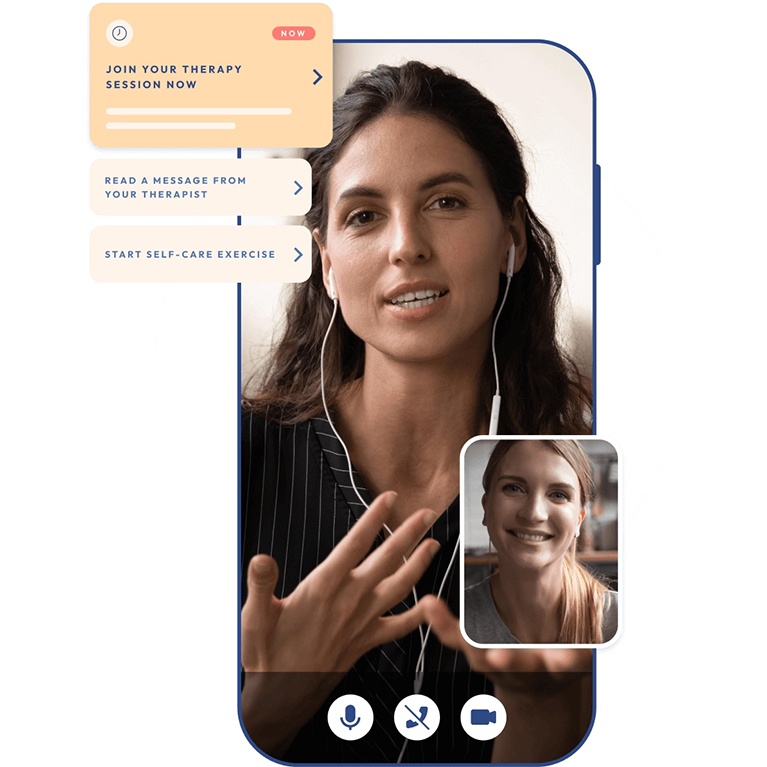
|
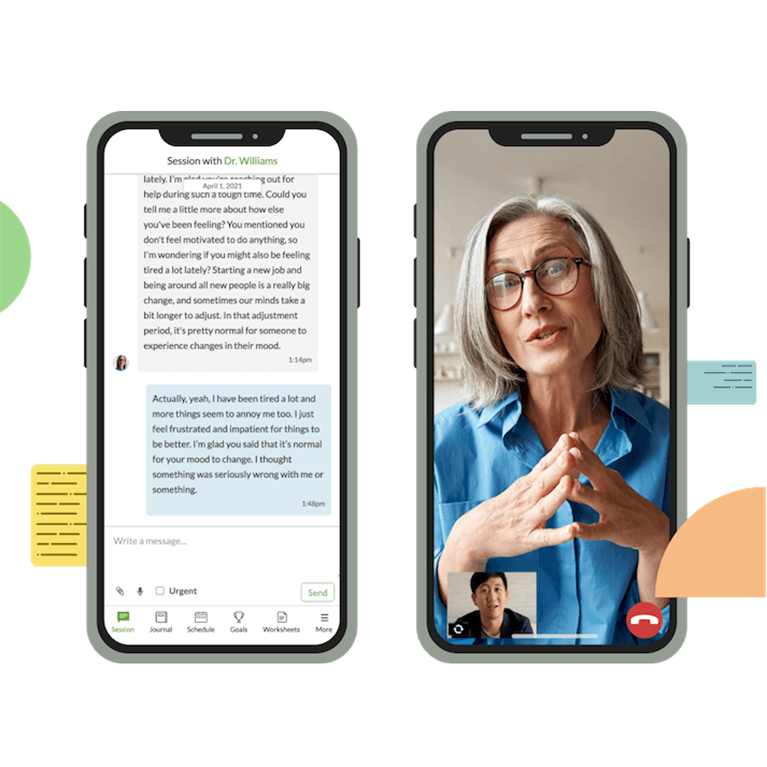
|
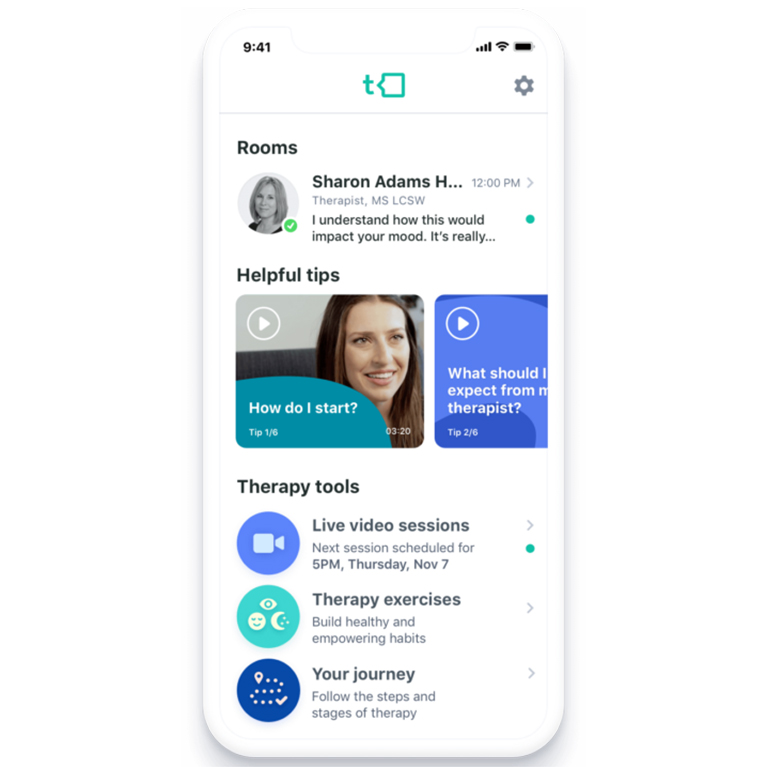
|
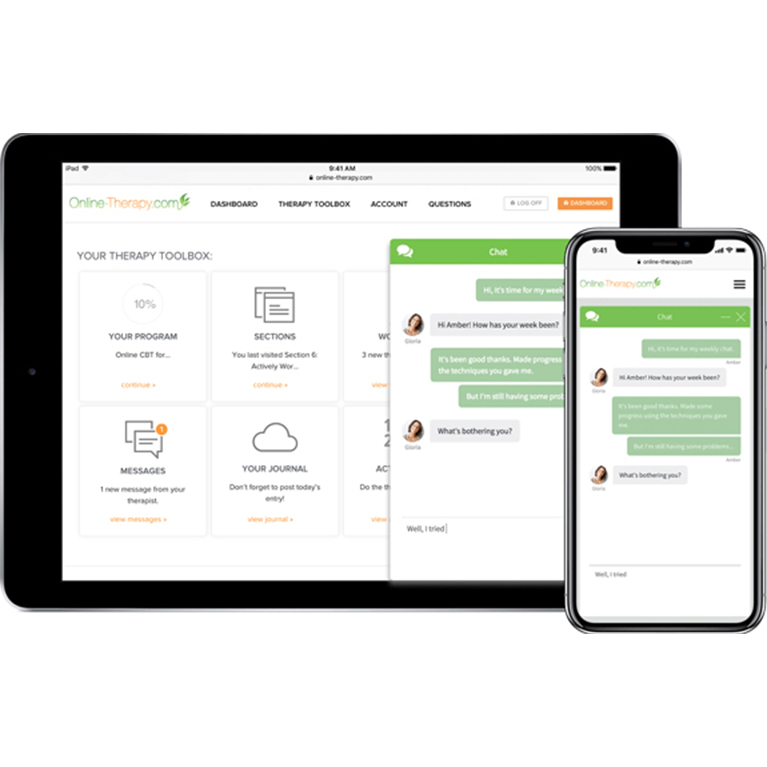
|

|
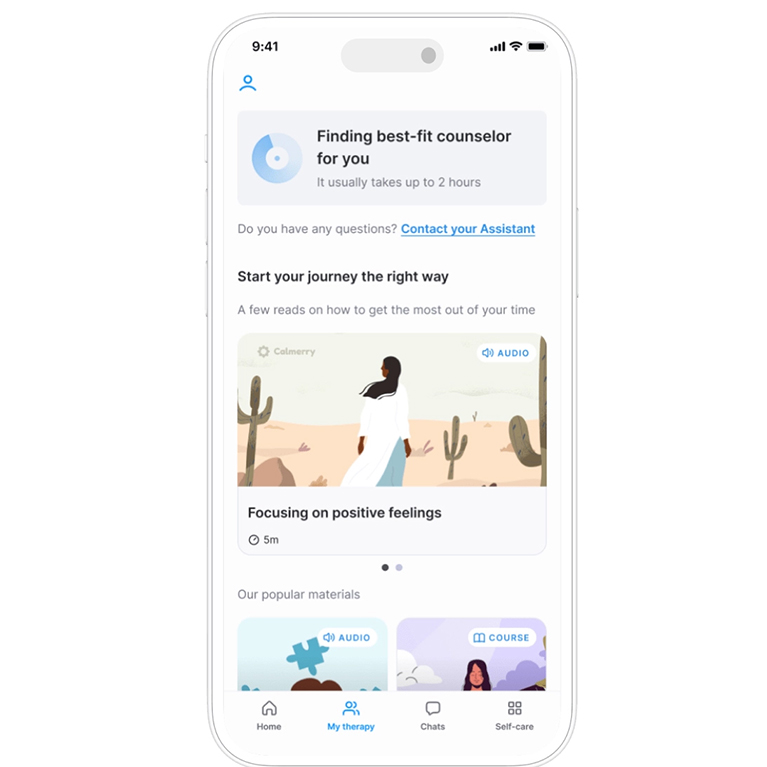
|
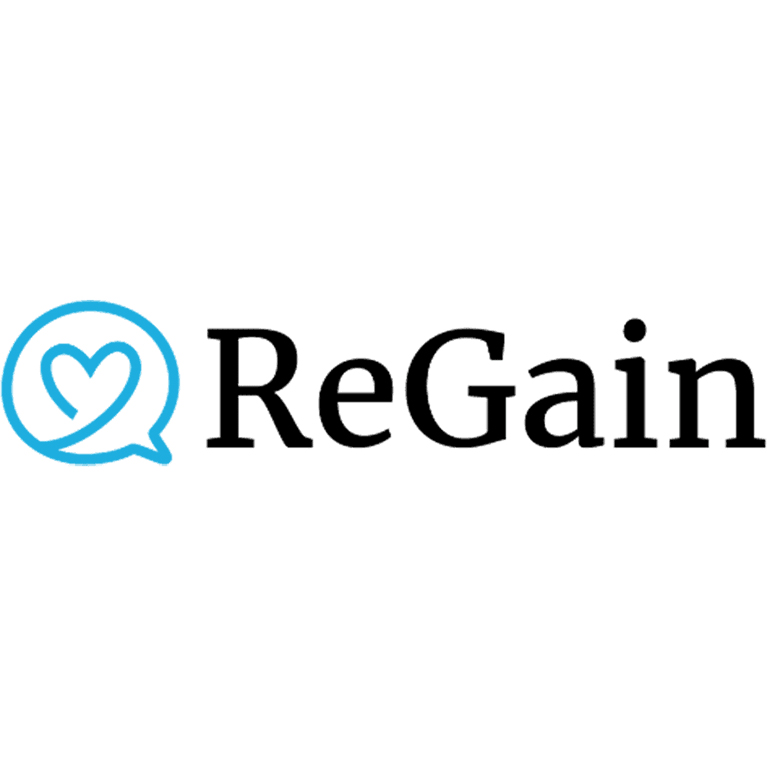
|
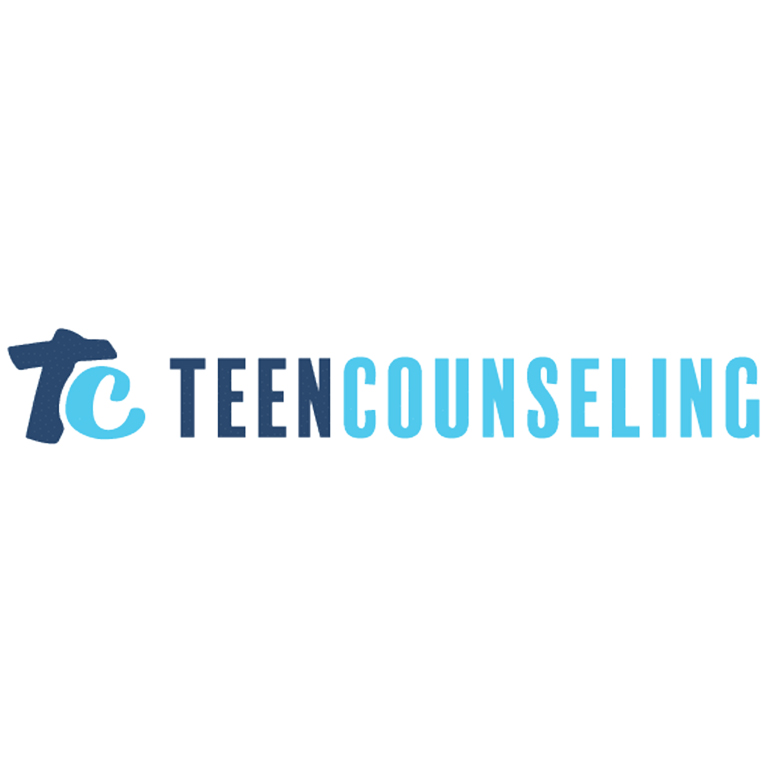
|

|

|
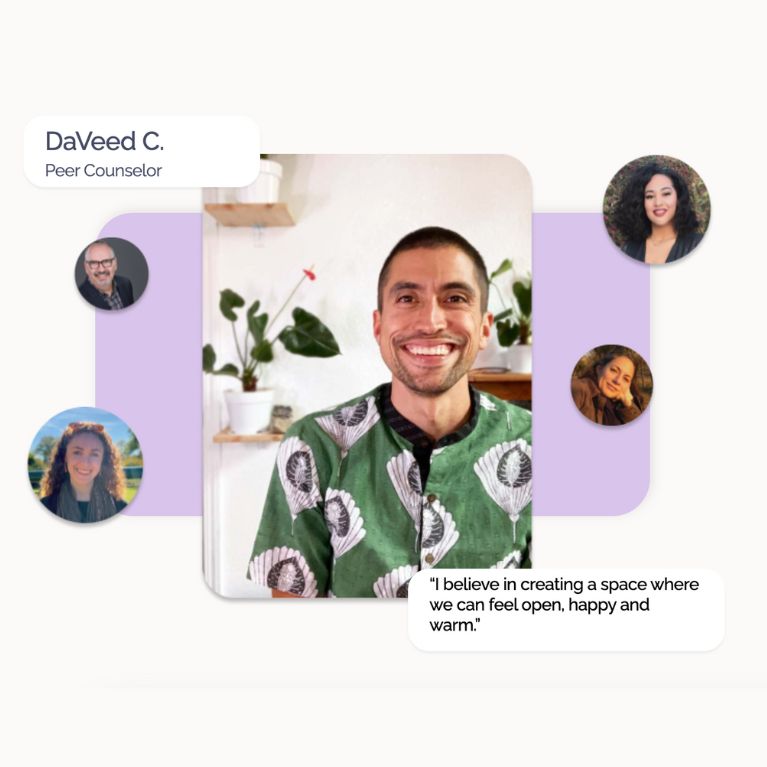
|
|
| Brightside Health | BetterHelp | Talkspace | Online-therapy.com | Talkiatry | Calmerry | Regain | Teen Counseling | Monument | 7 Cups | Peer Collective | |
| Rating | |||||||||||
| Cost | Starting at $95 per month | $70-$100 per week | $69- $109 per week | $50-$110 per week | Starting at $30 per session | $57-$90 per week | $65-$90 per week | $65-$90 per week | Starting at $14.99 per month | $0-$40 per week | Starting at $22 per session |
| Accepts insurance | Yes | No | Yes | No | Yes | No | No | No | Yes | No | No |
| Session type | Video and messaging | Video, phone, messaging, live chat | Video, phone, chat, messaging | Video, phone, messaging | Video or phone | Video and messaging | Video, phone, chat, messaging | Vide, messaging, phone, live chat | Video, audio, and messaging | Messaging | Video, phone, messaging |
Most comprehensive online therapy for depression: Brightside Health
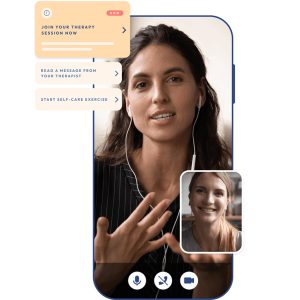

Key product features
What you should know
Brightside Health offers counseling services, diagnoses mental disorders, and prescribes medication. The app tracks symptoms and observes changes over time so you can follow your progress.
- Booking your first appointment is easy, and you can choose your provider.
- You must pay for a full month in advance, but it’s easy to cancel at any time.
- This platform is great for people who haven’t previously been diagnosed and are looking to better understand their symptoms and treatment options.
Why we like Brightside Health as most comprehensive
Brightside Health is an online mental health support platform that offers therapy, psychiatry, and self-care services. It provides support for a variety of conditions, including depression, anxiety, PTSD, postpartum depression, phobias, and more. Brightside Health is also one of the few online options that offer services that can be covered by insurance.
With the ability to choose between psychiatry with medication management, counseling, or a combination of both, the offered services are affordable. Many online therapy services make it challenging to just be evaluated and have medications prescribed and managed, but Brightside Health makes this easy. This is ideal since some individuals with a history of depression, or a good understanding of their current depression episode may prefer to only have medication prescribed. This may be because they either don’t feel the need or desire for counseling appointments or they cannot afford anything beyond medication as treatment.
While the combination medication and counseling approach has been shown to be the most effective treatment method for most depression cases, having the option to receive only one or the other allows Brightside consumers more autonomy with their mental health care. According to therapist Johnson, “The best depression treatment option, whether it’s medications or therapy, is the one a person will stick to consistently.”
As a Brightside Health patient, I’ve had a great experience with the service. I was looking for medication treatment but didn’t have insurance and wasn’t sure where to find it. I stumbled upon the website and was able to easily schedule an appointment with a psychiatrist and be seen within a couple of days. The whole process was smooth, and the app offers tools for self-care and check-ins.
To sign up, you’ll need to complete a short assessment to evaluate your symptoms. Once you’re set up, it’s easy to communicate with your provider. You’ll be asked to do check-ins frequently via the app to address your symptoms so your provider can evaluate how well your treatment is working.
The biggest downfall of this online treatment for depression is that once you’ve had medications prescribed and worked out a treatment that’s good for you, you’re still required to pay $45 per month in order to continue getting your monthly prescription. If you cancel your services, then any prescriptions on file at your pharmacy will be revoked. Overall, this platform earns 4.8 out of 5 stars —we love the accessibility and the variety of services, but not the way medication management works.
To learn more about this platform, visit our full Brightside Health review.
What customers are saying
Brightside earns a concerning 1.3 stars out of 5 on Trustpilot, with 113 ratings. Most negative reviews complain of over-billing, a confusing signup experience, and being charged even after cancelling.
However, positive reviews point to easy access to help when local therapists are unavailable, as well as excellent therapists on Brightside.
“Brightside works with my insurance provider (Aetna), so I enrolled after months of having trouble getting an in-person visit locally. Brightside has significantly improved my quality of life and my outlook on the future, and I cannot understate that. I am so grateful.”
Amanda P., Trustpilot reviewer
Specs
| Price | $95-$345 per month |
| Insurance accepted | Yes |
| Therapist assignment | Your choice |
| Session type | Video and messaging |
| Platform | Online, mobile app |
Best with a large network of licensed therapists: BetterHelp


Key product features
What you should know
As one of the original online therapy platforms, BetterHelp has a long reputation and has had the time to establish a large, qualified team of therapists for their customers.
- The website and app are easy to navigate.
- BetterHelp matches you with a therapist, but you can switch at any time.
- It’s perfect for people who want consistent weekly therapy services.
Why we like BetterHelp as best with a large network of licensed therapists
We like BetterHelp for a long list of reasons. There’s a pretty good chance that you’ve heard of BetterHelp even before beginning the hunt for services for yourself. This treatment for depression was one of the earlier online offerings available.
The company’s website currently claims that it’s the largest provider of online therapy services, with over 30,000 licensed therapists. Its array of therapists specializes in helping people with a range of mental health struggles, so BetterHelp makes it easy to find a provider who can offer appropriate support.
You’ll have unlimited access to your provider, as the service allows for messaging at any time. You can also access support via live chat, phone, and video sessions. We love that it’s easy to schedule your appointment and switch providers if one doesn’t suit your needs. You’ll initially be set up with a licensed therapist via the platform’s smart provider matching tool, but you’re not required to stick with the initial choice if you don’t want to. All providers are vetted and trained in a variety of therapeutic modalities.
Before actually signing up for services, you’ll need to complete a questionnaire that asks some questions about your current symptoms as well as some background and demographic information. Once you’re all set with your provider, you can access affordable and convenient support and can choose what type of support works for you and when. One week, you may prefer messaging, and the next, you may prefer video chat, which is fine on BetterHelp.
After combing through reviews of past and present users, we’ve found that BetterHelp is well-loved, and people tend to stick with it long-term once they are set up.
Check out our in-depth BetterHelp review for more information.
What customers are saying
BetterHelp has 4.5 out of 5 stars on Trustpilot, with nearly 7,500 ratings. It earns accolades from real users. Users love that they can text their therapist as little as much as they need to. Trustpilot is flooded with users expressing how grateful and satisfied they are with their therapist.
“Although at first it seems pricey, you can get a weekly therapy session, a weekly group therapy session, and take a class on literally any mental health topic you can imagine every week. They also have financial aid available. You can try out different therapists, guilt-free, until you find the one that is best equipped to help. Texting and phone calls are supported in times of need and general updates, and the video sessions run smoothly. I cannot recommend BetterHelp enough!”
Britney M., Trustpilot reviewer
One of the downfalls of BetterHelp is that it doesn’t accept insurance, though it does accept HSA payments. Customers have expressed frustration with this but for the most part, the benefits of the platform outweigh this downfall.
Specs
| Price | $70-$100 per week |
| Insurance accepted | No |
| Therapist assignment | Matched by platform, can change later |
| Session type | Video, phone, messaging, and live chat |
| Platform | Online, mobile app |
Best online therapy for depression with insurance: Talkspace
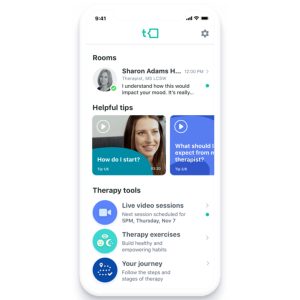
Key product features
What you should know
Accessing mental health services can be expensive, so therapy services that accept insurance are highly sought after. Talkspace is affordable with and without insurance.
- You can choose a plan based on the type and frequency of support you want.
- Talkspace offers workshops in addition to basic services, but they aren’t very affordable.
- It’s good for people who want to utilize their insurance benefits.
Why we like Talkspace as best with insurance
One of the most frustrating elements about many of the services that offer online treatment for depression is that they don’t take insurance. Accessing therapy can be costly, and if you have insurance that will cover the services, then you probably want or need to use that insurance.
Luckily, Talkspace does accept insurance, which makes it more accessible to many people. You’ll only pay around a $30 co-pay to access treatment. One of the first things you’ll do when setting up an account is input your insurance information so the platform can determine if it’s in-network and let you know what your co-pay will be.
Talkspace offers therapy to individuals, teens, and couples. It also offers psychiatry appointments and medication treatment. It will also match you with a therapist after asking a few questions, and if you want, you can change providers later.
Therapy plans start at $69 per week, and this setup includes unlimited messaging with your therapist. For $99 per week, you’ll have access to unlimited messaging with your therapist, plus a weekly video session. You can also choose the $109 per week plan, which provides access to video sessions, messaging, and weekly workshops. We love the workshop option for people who want a more interactive experience and are really dedicated to doing extra work to heal.
Whichever plan you choose, you’ll have to pay upfront for all sessions for the month. All of the plan prices are small compared to other platforms, especially considering what Talkspace offers.
We don’t like that you can’t do much on Talkspace without having to sign up. It would be nice to be able to browse the therapists and workshops available before actually paying for the services. It can be overwhelming to make such a big financial commitment without having all the information first. Unlike some other services that allow you to communicate with a therapist before officially committing, this is not the case with Talkspace.
Check out our in-depth Talkspace review for more information.
What customers are saying
Talkspace earns a 3.5-star average rating out of 5 on Trustpilot, with 358 ratings. Negative reviews note the difficulty in canceling, being charged for sessions that never happened, and difficulty with insurance coverage.
However, positive reviews point to excellent therapist quality and the ease of getting help when local services aren’t available.
“I have been using the Talkspace platform for a little over a year now. I was matched with a therapist who shows effort and focus in our sessions—I feel heard, and like I am making progress in the necessary areas.”
Bianca, Trustpilot reviewer
Specs
| Price | $70-$100 per week |
| Insurance accepted | Yes |
| Therapist assignment | Matched by platform, can change later |
| Session type | Video, phone, messaging, and live chat |
| Platform | Online, mobile app |
Best budget online therapy for depression: Online-therapy.com
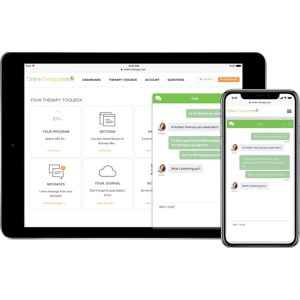

Key product features
What you should know
Online-therapy.com offers crucial mental health resources with a subscription that costs as little as $50 per week.
- Signing up is easy, but you can’t explore much about the services without doing so
- For an additional cost, you can get a more premium subscription with extras added on top of the usual two weekly live sessions
- A perfect fit for someone who is dedicated to improving and wants to do work outside of their therapy sessions
Why we like Online-therapy.com as best budget
While utilizing online therapy platforms to help with depression is useful, it may not be feasible for those dealing with tight financial circumstances. If you’re already struggling with depression, the last thing you want to add to your plate is financial stress. (2) Luckily, Online-therapy.com offers financial aid assistance, and its services are affordable even for those who don’t qualify for financial aid.
The most basic and affordable plan offered is just $50 per week, though new customers can usually expect to receive 20% off their first month. With this plan, you gain access to unlimited texting with your therapist, plus a therapy program. This plan does not include any live sessions with your therapist. For one weekly live session, you’ll need to sign up for the Standard Plan, which consists of a weekly life session, unlimited messaging, and the therapy program. The cost of this option is $80 per week. If one live session doesn’t quite cut it for you, you can pay $110 per week for two live sessions each week, plus the unlimited messaging and therapy program.
The therapists on Online-therapy.com primarily use a cognitive-behavioral therapy (CBT) approach, which is widely used and scientifically backed as being beneficial for the treatment of depression. Research shows that CBT practices can be successfully applied to online settings, and Online-therapy.com therapists make use of this practice and are able to successfully support their customers. (3)
“A primary goal of CBT is to address negative thought patterns. By identifying and changing negative beliefs that contribute to depression, a person can recognize distortions in their thinking. Over time, CBT can help individuals develop coping skills to increase relaxation and manage stressors that contribute to depression.”
Rychel Johnson, MS, LCPC, Fortune Recommends Mental Health Advisor
Along with the actual therapy, Online-therapy.com offers worksheets, a journal, an activity plan, and even yoga videos. You’ll be given many tools to help you overcome challenges you’re currently experiencing and have the tools to overcome any future challenges.
Read our full Online-therapy.com review for more information.
Specs
| Price | $50-$110 per week |
| Insurance accepted | No |
| Therapist assignment | Matched by platform, can change later |
| Session type | Video, phone, and messaging |
| Platform | Online |
Best online therapy for depression with psychiatry: Talkiatry


Key product features
What you should know
Talkiatry offers easy access to medical treatment for mental health issues but is only available in select states, and therapy is considered an add-on.
- There are a limited number of providers, which limits which states can utilize services.
- Without insurance, the services may be out of budget for many.
- A great option for people living in a state with access who want to use medication as a treatment for their symptoms.
Why we like Talkiatry as best for psychiatry
Talkiatry is different than a lot of the other online treatments for depression. That’s because it puts more focus on diagnosing disorders and treating them with medication than it does on easy access to therapy.
While therapy is offered as part of a treatment plan, the experience starts with meeting a psychiatrist to discuss what you’re struggling with and come up with a plan for treatment. After taking a quick assessment, you’ll meet your psychiatrist within a few days. Online psychiatry is still relatively new but has proven to have many benefits. (4)
The downside of Talkiatry is that it’s not offered in every state. It’s currently only available in 43 states, with over 300 licensed psychiatrists. We tried to access more information about treatment plans using an Idaho address and were told to check back later.
We love that Talkiatry accepts most insurances and only costs around a $30 co-pay. When you first meet with your psychiatrist, your appointment will be 60 minutes long, and your follow-up appointments will be 30 minutes long. This is a decent amount of meeting time, as some other services only give you 15 minutes with your provider.
Keep in mind that psychiatry services are quite different than regular therapy. You’ll be assessed by a psychiatrist so they can determine what your diagnosis may be and provide treatment suggestions.
If you’re diagnosed with depression, your provider will likely review medication options as well as supplemental treatment like therapy. If therapy is recommended, then you’ll pay for the additional service, which will give you unlimited messaging access to your therapist.
We found the website easy to access, and so long as there are licensed psychiatrists available in your state, it’s easy to get your initial appointment set up. Providers on Talkiatry can even prescribe controlled substances, which is rare when it comes to online therapy services.
Unlike other platforms that make it easy to switch providers, if you’re not on board with the one you have, switching isn’t easy. Switching providers will require an email or phone call. You’ll also need to call or email if you decide to cancel services.
Overall, while Talkiatry’s website feels outdated, it’s still easier than making an in-person appointment with a psychiatrist. Additionally, the fact that insurance covers the services makes it more accessible to many people.
Read our full Talkiatry review for more information.
What customers are saying
Unfortunately, many customers don’t have great things to say about this online psychiatry platform. Talkiatry’s rating on Trustpilot is just 1.5 out of 5 stars, with 205 total reviews.
Many customers complained about billing issues with their insurance and long waits to see a psychiatrist.
“It took over a month to get the first visit scheduled,” writes Jenny D. on Trustpilot. “The provider canceled at the last minute. Then, it took almost another month to reschedule. After spending an hour with the provider when I was very clear on my intake form what I needed, I found out at the end of the appointment that she couldn’t write my medication and that she said I needed to talk to a different provider for my prescription!”
The customers who left positive reviews specifically commented on their provider rather than the platform itself.
“I have been using Talkiatry for both medication management and counseling for a few months now and have not encountered any of the scheduling, billing, or communication issues that others have experienced. I’m not trying to take their experiences away from them, just wanted to note that they do have some phenomenal doctors & therapists on staff!”
Brooke W., Trustpilot reviewer
Specs
| Price | Starting at a $30 co-pay per session |
| Insurance accepted | Yes |
| Therapist assignment | Matched by platform, can change later |
| Session type | Video or messaging |
| Platform | Online |
Best cognitive behavioral therapy for depression: Calmerry
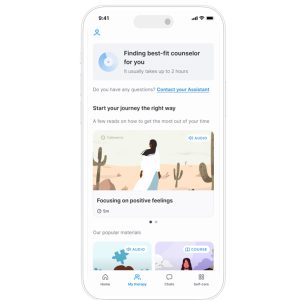

Key product features
What you should know
Calmerry is an easy-to-navigate platform that utilizes a CBT approach and allows you to immediately interact with someone. With the option to quickly review all therapist options, finding the right match is easy.
- The website is simple to navigate and allows you to see many of the offerings before paying.
- With the minimum weekly cost of $57, it has a lot to offer for what you pay.
- Calmerry is best for people who want to know before they buy.
Why we like Calmerry as best cognitive behavioral therapy
Cognitive behavioral therapy (CBT) is an approach that’s proven to be beneficial for those struggling with depression. (5) Many providers on Calmerry use CBT, so those struggling with depression can feel reassured knowing a proven solution is available.
The Calmerry website is easy to navigate. While you have to sign up and answer a few questions to access more than just the basic information, the process takes less than five minutes. Then, you’ll see a rating of where your current mood and needs and will be presented with information regarding how Calmerry can assist you in improving your symptoms.
For someone struggling with depression, the last thing you likely want to do is jump through hoops to access treatment, so we love that this service doesn’t require that. Calmerry has a network of over 1,000 providers and claims that you’ll be connected with a therapist match within an hour.
In my experience, this held up to be true. I instantly received a message from a real person letting me know they were working on finding me a therapist and that I could ask anything I needed in the meantime. It’s great that you’re able to interact with real people on the platform prior to paying for services. In fact, you can interact with all aspects of Calmerry, including the therapy plan section, mood tracker, and journal. You can also complete assessments on your own if you’d like.
When I checked the schedule while waiting to be matched with a therapist, I found that I could get an appointment within the hour. This is great for people who are struggling and need immediate assistance.
On top of all that, you can easily view the available therapists and choose which one you want if that’s your preference. Each therapist is presented on a simple slide with information about how long they have been practicing, what areas they specialize in, and whether they’re a verified provider.
Services start at $57 per week and can cost as much as $90 per week. The basic and cheapest plan includes messaging only, while the moderate plan includes two live sessions weekly, and the more intense plan includes four live visits per week. The cost of the services on Calmerry is comparable to most others. However, the messaging-only plan is on the lower end of the price scale, and you can typically access a discount for your first month.
Check out our full Calmerry review for more information.
What customers are saying
On Trustpilot, Calmerry earns an impressive 4.1-star rating out of 5, with 50 total reviews. The many positive reviews mention helpful therapists, plentiful resources and features, and an overall improvement in mental health.
“Calmerry was my first experience with a therapist, and it was great. Mikela introduced me to CBT and this method really changed my life. I’ve gained new coping strategies, and now I feel confident and calm cause I know how to deal with my anxiety.”
Conner H., Trustpilot reviewer
Customers had some complaints about glitches within the app and issues with individual therapists.
Specs
| Price | $57-$90 per week |
| Insurance accepted | No |
| Therapist assignment | Matched by platform, can change later |
| Session type | Video and messaging |
| Platform | Online, mobile app |
Best online therapy for depression for couples: Regain
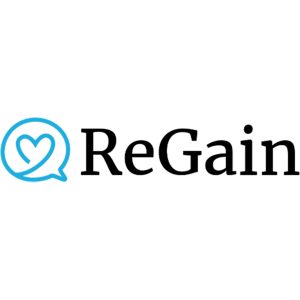

Key product features
What you should know
Regain aims to give couples a customized therapy experience where they have control of when and how they receive therapy. By asking questions about your personal and relationship needs before signing up, your therapist will have a good understanding of your expectations before you get started.
- You’re unable to browse therapists, but the platform has a system for matching you with one that will suit your needs
- $90 is an affordable rate for unlimited messaging and a weekly video call
- Best for couples who want relationship support in a comfortable environment
Why we like Regain as best for couples
It can be a big step for couples to decide to pursue couples counseling, especially so when one or both partners are experiencing depression. So once that decision is made, it’s ideal that the process goes smoothly. (6) The sign-up process for Regain is simple—you’ll be asked questions about yourself, what relationship problems you’d like to address, what you want from your therapist, and what personal issues you’d like to address. You will then have the option to invite your partner or not.
However, unlike many other platforms, you can’t get access to Regain without paying first. You can’t browse therapists or choose your own, either.
But ReGain has over 15,000 therapists, so if you don’t like the one you’re initially matched with, you can ask to be matched with a new one. Regain is a sister site of BetterHelp—it’s just more focused on couples therapy rather than individual therapy.
To access therapy you’ll pay $65-$90 per week, which includes one live video or phone session per week and unlimited messaging to your therapist. Unfortunately, the cheaper rate only applies to students. Even at $90 per week, the cost is comparable to other therapy services that include a video call every week.
If you decide to make a change to your membership at any time, you can easily do this by going to your account settings.
Check out our full Regain review for more information.
What customers are saying
Regain’s rating on Trustpilot is 3.3 out of 5 stars, with 217 reviews. Many reviews mention helpful, caring therapists who work with couples to explore solutions together.
“Better Help (Regain) has been a wonderful tool for me and my husband. We have had individual as well as joint therapy sessions. Our therapist worked with us on a variety of things and has been awesome at helping us progress towards our goals. I 100% recommend giving them a chance if considering therapy.”
Haylee, Trustpilot reviewer
Some of the major complaints from customers are that there may be a week when either the therapist or customer isn’t available, but you’ll still be charged. Related complaints talked about issues with being matched with providers in different time zones, which makes scheduling difficult.
Specs
| Price | $65-$90 per week |
| Insurance accepted | No |
| Therapist assignment | Matched by platform, can change later |
| Session type | Video, phone, and messaging |
| Platform | Online, mobile app |
Best online therapy for depression for teens: Teen Counseling


Key product features
What you should know
This easily accessible platform is a great option for teens and their parents who want to get a grip on depression symptoms before they get out of hand.
- There aren’t a lot of extras available beyond therapy services.
- At $360 a month, the cost limits access
- Best for teens who are committed to improving depression symptoms.
Why we like Teen Counseling as best for teens
If you’re a teen or parent of one and have concerns regarding depression, early diagnoses and treatment are ideal. It’s not easy to find online therapy for teens, as what will work depends so much on each individual’s needs and struggles. There can also be a lot of barriers to teens receiving treatment for depression, but being able to access treatment from anywhere via technology will hopefully help break down some of those barriers. (7)
“When considering seeking help, teens aren’t always sure how to seek help and might not want their parents worrying about them if they share their depression struggles. Additionally, teens may not have access to a confidential space to meet with a therapist and worry about family members listening in on their therapy sessions, so they avoid asking for a therapist. While these barriers exist, depression treatment for teens is crucial. With rising rates of depression, self-harm, and suicidal ideation, it’s critical for teens to have therapy resources available to them. Teens can benefit from learning coping skills to guide them through the tumultuous years of middle school and high school, where identity formation is easily impacted by depressive symptoms.” (8)
Rychel Johnson, MS, LCPC, Fortune Recommends Mental Health Advisor
Teen counseling has over 14,000 licensed therapists, and they’re accessible via text, phone, or video chat. Having such a vast pool of therapists makes it more likely that there’s a therapist available to match your needs. Upon signing up, you’ll be matched with a therapist and then communication can begin.
Without signing up, the only part of Teen Counseling you can access is FAQs and reviews, so if you’re hoping to explore before signing up, that’s not exactly possible. While this is common with other online therapy sites, it’s still disappointing.
Teen Counseling has two separate environments: one for the parent and one for the teen. However, what happens between the teen and therapist remains confidential unless there’s a serious concern.
Aside from the actual therapy that occurs, Teen Counseling doesn’t offer any other tools to assist in treatment. If you need more assistance, you can reach out to the support team, but that’s about it. We think it would be beneficial if there were worksheets or other interactive aspects of the platform that were available to both the teen and the parent as supplemental materials.
What customers are saying
With 55 reviews, Teen Counseling earns 3.1 stars out of 5 on Trustpilot. Satisfied customers mention accessibility, especially for teens who find in-person visits intimidating.
“The platform is so easy to use. I love being able to find therapists experience in their own words as well as reviews of patients. They make it so easy to schedule appointments via video or phone. And they seem to actually ensure you feel comfortable with process along the way. I’m a single mom and can use any type of support necessary to ensure my daughter’s mental health is ok. I’m so appreciative!”
Desiree P., Trustpilot reviewer
Negative reviews note overcharging, being billed even when sessions don’t occur, and flaky therapists.
Specs
| Price | $65-$90 per week |
| Insurance accepted | No |
| Therapist assignment | Matched by platform, can change later |
| Session type | Video, phone, messaging, and live chat |
| Platform | Online, mobile app |
Best online therapy for depression for substance use: Monument


Key product features
What you should know
Monument has many great features for people struggling with substance abuse, from personalized physician treatment options to group therapy.
- Not all features are available in every state, and medication management is limited to certain areas.
- The community-only membership is only about $50 per month.
- Ideal for people who struggle with substance misuse and want to have community support.
Why we like Monument as best for substance use
Monument is an online therapy platform that focuses on helping individuals build healthy habits and eliminate ones that are negatively impacting their lives. It focuses specifically on alcohol use disorder. “For someone trying to reduce substance use, frequent check-ins can be helpful,” Johnson adds. “Individuals wanting to reduce alcohol use can benefit from the structured treatment planning that therapy offers and set beneficial goals with the support of a qualified therapist.”
This is yet another online therapy service that requires you to pay for a membership before you can explore the features and therapists it offers. However, once you’re signed up, Monument has some impressive offerings.
You’ll start by meeting with your matched therapist, then have a consultation with a physician to determine if medication may help you on your journey to reduce alcohol use. Not many other programs offer physician consultation and medication assistance for substance use, which makes it a standout feature.
In addition, Monument gives you access to support groups and online courses. The combination of real-time support and tools to improve coping skills can help reduce the chances of struggling in the future. (9, 10)
Momentum also offers articles written by experts to help you better understand your struggle and how to deal with it. It even has live community events that you can attend. This is great for those individuals struggling with substance use who thrive in social environments.
If the community aspect is appealing and therapy is not something you’re ready for, you can pay a monthly membership fee of $14.99 to gain access to the community-only features. With it, you can attend live support group calls.
Unfortunately, this may be the only option for people in some states. Therapy and medication treatment are only available in 20 states.
If you live in a state where these services are available, you can select from a variety of plans. The Physician Care Plan is about $10 per month, and the Total Care Weekly Plan is $249 per month, which includes one video call per week, unlimited physician appointments, medication management, support groups and community foams, and chat-based messaging with your therapist and physician. You can also choose a biweekly therapy plan for $149 monthly.
Specs
| Price | $14.99 to $249 per month |
| Insurance accepted | Yes |
| Therapist assignment | Matched by platform, can change later |
| Session type | Video and messaging |
| Platform | Online |
Best free online therapy for depression: 7 Cups


Key product features
What you should know
This free therapy service offers a mix of licensed therapists and volunteer listeners who are ready to listen and provide guidance for those in need.
- 7 Cups offers a variety of therapy approaches.
- The optional upgraded plan offers a customized healing plan.
- This platform could be a game changer for people struggling with their mental health who do not have the financial means to pay for therapy.
Why we like 7 Cups as best free
Paid therapy options are not an option for many people in need. Research shows that affordability is one of the main perceived barriers to mental health services. (11)
7 Cups is unique because it’s free, but also because—along with having licensed counselors—there are also ‘listeners’ available. When signing up, one of the questions you’re asked is which resources would be useful to you. These resources include options like support groups, professional therapy, and even AI therapy chatbots.
When I was exploring 7 Cups, I checked a variety of options to an idea of the offerings. I was presented with the option to say whether I was interested in expert help, along with various educational pieces about treatment.
The sign-up process was a combination of questions and education, which made it time-consuming, and I nearly lost interest. My answers were used to create a personalized plan to reduce distress associated with depression by a date three months in the future. I was then offered the opportunity to upgrade to the premium experience for $12.95 per month after a free seven-day trial. With only the free plan, you can still access 24/7 emotional support, a personalized plan, and a variety of educational tools.
Although there are professionals available, you can also chat with someone as just a friend or listening ear. You can either connect with the first available listener or search the trained listener database to find someone who matches up with your background or has experienced struggles similar to yours.
“Peer support is a valuable resource,” Johnson says. “Often, when working with a mental health professional, you can sense barriers in the relationship when the therapist has not had a similar lived experience. By confiding in a listener, you may feel less pressure to appear a certain way.”
All listeners are required to complete an online course to help them develop helpful listening skills. It’s an excellent platform if you’re just looking for someone outside your circle to vent to. You can even give back and be a listener yourself if it suits you.
What customers are saying
With 540 reviews on Trustpilot, 7 Cups earns an impressive 4.7 stars out of 5. Reviewers admire the judgment-free community and accessible price, and reviewers who serve as listeners report getting a lot out of the experience.
“I’ve been a member of 7 Cups for eight years. It’s a great place to get help with personal problems from money worries to heartbreak and all in between. Lovely people who show such respect for all. I highly recommend 7 Cups.”
David E., Trustpilot reviewer
The few negative reviews mention specific, unhelpful listeners and overbearing community moderators.
Specs
| Price | $0-$40 per week |
| Insurance accepted | No |
| Therapist assignment | Matched by platform, can change later |
| Session type | Video and messaging |
| Platform | Online, mobile app |
Best online therapy for depression for peer counseling: Peer Collective


Key product features
What you should know
Peer Collective lets you share your symptoms and experiences with like-minded individuals to encourage healing.
- You can browse providers and listeners and choose one that works for you.
- The pay-per-session setup can take some stress off from the financial burden of therapy.
- Great for people who do not want to commit to sessions upfront.
Why we like Peer Collective as best for peer counseling
If you’re experiencing depression and are not interested in a medical diagnosis or medication, but would like to have someone to talk to, then Peer Collective is the perfect fit. Rather than speaking to a licensed clinician, you’ll instead chat with someone similar to yourself who has shared experiences and has been trained by professionals.
The idea of a diagnosis or medication can be too much to handle for some people. If that’s the case for you, peer counseling is likely a better option than professional counseling. In my experience, peer counseling feels more personal, and you’re able to focus more on what you have to say rather than worrying about someone trying to ‘fix’ you.
Peer Collective’s pricing is quite a bit different than that of other platforms because you pay per session rather than by week or month. The cheapest session is $22 and lasts for 30 minutes. You can also purchase a ‘package deal’ and get 4 hours for $100. This is very affordable compared to other services.
This type of mental health support isn’t ideal for someone with severe mental health issues or those in crisis who need an immediate resolution. While some support is better than no support, these types of struggles are best handled by professionals, and anyone in severe distress should seek more intensive services.
Peer counselors can allow you to feel understood and acknowledged. They may share their own real-life experiences to help you relate to them and potentially resolve some of the struggles in your life. Professional counselors are better known for being objective and do not typically spend time trying to bond with or relate to their clients.
When you sign up, you can browse the peer counselors and choose one that feels like a good fit. If you don’t mesh after a session or two, then you can move on to a new counselor. All sessions will take place via Zoom or by phone.
We do feel like the Peer Collective website could use some work. There are some broken links that disrupt the navigation of the website. There aren’t many ‘extras’ available on Peer Collective, but what is available is affordable and of quality.
Specs
| Price | $0-$40 per week |
| Insurance accepted | No |
| Therapist assignment | Matched by platform, can change later |
| Session type | Video and messaging |
| Platform | Online, mobile app |
How to choose the best online treatment for depression
When searching for online therapy for depression, there are a few factors to consider to help you land on the most suitable platform for you. Here is a quick breakdown of what you might consider before deciding.
- Cost and insurance: The price and payment structure for online therapy can vary greatly, with some coming in as low as $22 per session and others up to $110 for a weekly subscription. If you’re covered by insurance, you can save even more, with the average cost falling between $0 and $45 per session. Before you begin your search, we suggest laying out your therapy budget and consulting with your insurance company to help you understand your benefits coverage. Additionally, some platforms accept insurance, while others don’t. You’ll want to verify which online therapy services accept your particular plan and if that’s the route you want to go.
- Session type and length: How you want to engage with your therapist comes down to personal preference. Consider what communication style works best for you—video, phone, chat, or a combination—and how often you want to contact your provider. You should also take into account how much time you can set aside for therapy to ensure you find a platform that offers scheduling options and session lengths that fit your schedule. We’ve discovered platforms that offer sessions as short as 15 minutes for those pressed for time, while others may prefer to spend more time with their provider on a platform that provides 30- to 60-minute sessions.
- Provider type: You should carefully consider the severity of your symptoms and whether you’re seeking a mental health diagnosis or not to determine whether you need a licensed professional or if a peer support person or trained listener would suffice. On some platforms, you can view a provider’s profile to see pertinent information about their training, experience, therapy approach, and more to help you choose the therapist who best fits your preferences and needs. Even with that information, the first therapist you pick or get matched with may not be a good fit. Choosing a platform that makes it easy to switch providers can help you find the right one with little hassle. Additionally, if you want to pair therapy with medication management, then you also want to look for programs that provide access to psychiatry appointments.
- Therapy approach: Different online therapy platforms and individual therapists may specialize in various evidence-based talk therapy treatments. While many can provide proven benefits for treating depression, Cognitive Behavioral Therapy (CBT) and Interpersonal Therapy (ITP) are two of the most commonly used methods. We recommend exploring whether your therapist has experience treating others with similar concerns using these methods or what approach they may recommend for your unique situation if either of those isn’t appropriate.
- Features and tools: Some online therapy services provide access to depression assessments, learning modules, a mobile app, unlimited messaging, or other helpful tools. Determine which extra features are important to you to ensure the platform you choose offers them and whether there’s any additional cost to access them.
Who should use online therapy for depression?
Online therapy is an acceptable treatment for depression for individuals who are not in need of immediate medical assistance and do not have a history of severe mental disturbances. While some therapy is typically better than none, some people will benefit more from face-to-face therapy or may require hospitalization if their symptoms are too severe.
Online therapy may not be a great fit for those who struggle to hold themselves accountable. These individuals may fail to show up to online appointments and would benefit more from a face-to-face interaction, where they will be accountable for their actions if they form an in-person relationship with their provider. Online therapy options are less equipped to handle clinical crises, according to a study conducted on internet-based cognitive behavioral therapy. (12)
Who should not use online therapy for depression?
Online therapy can be an incredibly beneficial tool for many people, but that doesn’t mean it’s appropriate for everyone. There are certain circumstances and mental health conditions that are best treated through in-person therapy or other interventions.
If you’re experiencing severe or more complex symptoms of depression or another mental health condition, online therapy may not be the best approach for you. Instead, your provider may prefer to provide more intensive support through in-person visits. Meeting face-to-face can help your therapist closely monitor your condition, better read non-verbal cues, and provide immediate assistance in the event of a mental health crisis.
In fact, most online therapy platforms are not equipped to care for individuals experiencing a mental health crisis. If you or a loved one experiences thoughts of suicide or harming yourself or others, you should seek immediate help by calling 988, texting “HOME” to 741-741, or calling 911.
Another consideration to make is how well you can connect with others virtually. Therapy is most successful when you can create a strong relationship with your therapist. For some individuals, that can be challenging through video, phone, or messaging sessions. If you can relate, in-person therapy may be better than teletherapy.
Furthermore, you should assess your internet reliability and comfort with technology before committing to online therapy. Communication issues when using technology can be common, and frequent disruptions or difficulty connecting to your sessions can significantly disrupt your treatment plan. You’ll need a strong internet connection and at least basic tech knowledge to engage effectively in your sessions.
What type of online therapy is best for depression?
Of the many different approaches to psychotherapy (also known as talk therapy), some methods are more effective than others at treating depression. Two of the most common evidence-based therapies to treat depression include Cognitive Behavioral Therapy (CBT) and Interpersonal Therapy (IPT). (13)
CBT helps individuals recognize the relationship between behaviors, thoughts, and feelings and how that impacts their mood, well-being, and how they view themselves and the world around them. This approach encourages you to challenge unhelpful thinking and behavioral patterns that can impair functioning. It teaches you that it’s possible to change both, which can lead to healthier behaviors and improved emotional regulation. (14) Throughout many studies, CBT is well supported as an effective treatment for depression. (15)
As another widely accepted therapy approach, IPT focuses on improving relationships and life events that are closely linked to the current episode of depression. (14) It centers on the idea that reducing problematic relationships and strengthening social support helps improve your mood and mental health symptoms. (16) Therapists often work with patients to enhance their communication skills and develop other social strategies that can help improve the quality of their relationships.
Choosing a platform or therapist that specializes in either or both of these therapy approaches can help you find an effective treatment plan to help reduce your depressive symptoms. However, it’s important to recognize that each individual is unique, so your therapist may recommend a different treatment option better suited for your situation.
How to prepare for your first session of online therapy for depression
Your first session of online therapy may feel intimidating, but it will get easier over time. Prior to your first session, write down any questions you may have for your provider. These questions can address the services themselves, the issues you’re currently struggling with, or even be related to gaining a better understanding of the benefits of online therapy for depression.
You should also be prepared to share a decent amount of information about what you’re experiencing. It can be both overwhelming and relieving to share your concerns and needs with someone, so be prepared to experience a lot of emotions and maybe even cry. I personally cried during my first appointment with my online provider, but a lot of the tears were simply because I was so relieved to finally get out what I had to say.
Keep in mind that online therapy sessions are meant to be judgement-free, and you should not worry about trying to appear a certain way to your provider. Some people feel concerned that their provider is assessing everything they say and do, and this makes them feel self-conscious. Before your appointment, remind yourself that your provider’s only intent is to help you, so it’s ok to let it all out. “Show up as you are, in comfortable clothing if you’d prefer, and know you are deserving of receiving help,” Johnson says.
Emergency situations
If you or someone you know is experiencing a crisis and need immediate support, call 911.
Here are some additional resources available to individuals in the United States that can be accessed in crisis situations:
- Suicide & Crisis Lifeline: Call or text 988
- National Domestic Violence Hotline: 1-800-799-7233
- Crisis Text Line: Text “DESERVE” TO 741-741
- Lifeline Crisis Chat (Online live messaging): https://988lifeline.org/chat
- Self-Harm Hotline: 1-800-DONT CUT (1-800-366-8288)
- Essential local and community services: 211, https://www.211.org/
- Planned Parenthood Hotline: 1-800-230-PLAN (7526)
- American Association of Poison Control Centers: 1-800-222-1222
- National Council on Alcoholism & Drug Dependency Hope Line: 1-800-622-2255
- National Crisis Line – Anorexia and Bulimia: 1-800-233-4357
- LGBT Hotline: 1-888-843-4564
- TREVOR Crisis Hotline: 1-866-488-7386
- AIDS Crisis Line: 1-800-221-7044
- Veterans Crisis Line: https://www.veteranscrisisline.net
- TransLifeline: https://www.translifeline.org – 877-565-8860
FAQs
Is medication prescribed during online therapy?
Some online platforms can prescribe medications, but not all. If you’re looking for online therapy that can prescribe medications, your best option is an option like Brightside Health which offers psychiatry appointments and medication management services. Keep in mind that many online services do not prescribe controlled substances.
Will depression get better on its own?
While some bouts of depression can be resolved on their own or by engaging in health behaviors like exercise and self-care, some depression episodes need more intense treatment like professional counseling or medication. It’s a good idea to find a service that offers free symptom tracking and assessment tools to determine if your symptoms are improving over time. If your symptoms continue to get worse or do not improve, it’s recommended that you seek outside support.
Is online therapy for depression recommended to improve mental health?
Yes, online therapy is helpful for improving depression and other mental health issues. For many people, online therapy makes mental health services more accessible, and although it’s different than face-to-face therapy, research shows that it has just as many benefits. (17)
Is online therapy for depression covered by insurance?
Online therapy for depression may be covered by your insurance. Not all platforms offer services covered by insurance, but there are some like Talkiatry and Talkspace, that do. You may be required to pay a co-pay for your services, and should double-check to see if only part or all of the services will be covered.
Does online therapy for depression work?
Yes, online therapy for depression does work if you commit to the process and work closely with your provider. Many online therapy platforms give you access to community support groups as well as learning resources that will be helpful now as well as in the future. As with most things, online therapy will only work if you put in work and follow the guidance given to you.
Does online group therapy work for depression?
Group therapy has proven as effective as individual therapy at reducing a wide range of mental health symptoms and conditions, including depression, and that remains true when conducted online. (18, 19) The peer support offered through group therapy can help reduce stigma, offer a range of perspectives and experiences, and motivate and uplift individuals through validation and mutual encouragement. Online treatment continues to provide all these benefits, with the added advantages of convenience, flexibility, and the comfort of attending from a familiar environment.
What are the limitations of online therapy for depression?
Online therapy isn’t the perfect solution as it does carry some limitations. Some of the most common challenges include difficulties forming a strong bond with a therapist virtually, limited communication without full body language cues, and disruptions from unreliable internet or technology. You may also encounter privacy concerns when sharing sensitive information online or in the presence of others if you don’t have a private space to join your sessions.
Our experts
Rychel Johnson, M.S., LCPC
Rychel is a licensed clinical professional counselor in Kansas. She owns a private practice specializing in anxiety treatment and social skills development. Rychel also enjoys extensive road trips and spending time with her husband, daughter, and two cats.
Krista Manning
Krista Manning is an accomplished medical copy editor and fact-checker who stands out in the pharmaceutical, health, and wellness domains. With a meticulous eye for detail and a command of medical language, Krista ensures the accuracy and clarity of content. Beyond her professional expertise, Krista is an advocate for mental health awareness. Recognizing the crucial intersection of psychological and physical well-being, she actively contributes to projects that promote mental health awareness within the healthcare narrative. Krista’s commitment extends beyond the pages she edits, emphasizing the holistic nature of health communication.

Amber Nelson, MS, Behavioral Interventionist
Fortune Recommends Writer
About Author
Amber Nelson has an educational background in psychology but stumbled into love with weightlifting and running when she decided to go on a weight loss journey. She became fully immersed in the health and fitness community overtime. Eventually her passion for writing collided with this community when she became a health and fitness writer, leading to publications for Active.com, BarBend.com, and iRunFar.com.
